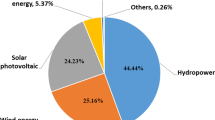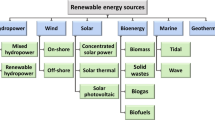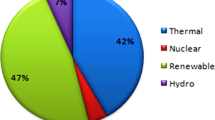Abstract
This paper presents a comprehensive overview of the potential and outlook of solar energy in Pakistan as a source of renewable and sustainable energy. A detailed energy infrastructure and major reasons behind the power crisis in Pakistan are presented followed by a detailed assessment of solar energy potential. The results obtained from the solar atlas for solar irradiation and PV electricity output show a high potential of solar power throughout the country. An average value of 4.1 kWh/kWp per day is obtained from an installed capacity of 1 KWp. Furthermore, the total estimated potential of solar power in Pakistan is around 2900 GW and its effective use will help in the growth of the country’s economy by reducing the import of fossil fuels. It is foreseen that the present research will help nations develop and utilize solar power in their respective countries efficiently and effectively.
Similar content being viewed by others
References
M. M. Rafique, P. Gandhidasan, S. Rehman and L. M. Al-Hadhrami, A review on desiccant based evaporative cooling systems, Renewable and Sustainable Energy Reviews, 45 (2015) 145–159.
Global Market Outlook for Solar Power 2015–2019, SolarPower Europe (2015).
A Snapshot of Global PV (1992–2014), International Energy Agency (2015).
M. M. Rafique and S. Rehman, National energy scenario of Pakistan — Current status, future alternatives, and institutional infrastructure: an overview, Renewable and Sustainable Energy Reviews, 69 (2017) 156–167.
M. M. Rafique, H. M. Bahaidarah and M. K. Anwar, Enabling private sector investment in off-grid electrification for cleaner production: Optimum designing and achievable rate of unit electricity, J. of Cleaner Production, 206 (2019) 508–523.
The Energy Expert Group, Integrated Energy Plan 2009–2022, Economic Advisory Council, Islamabad, Government of Pakistan (2009).
M. M. Rafique, S. Rehman and L. M. Al-Hadhrami, Developing zero energy and sustainable villages — A case study for communities of the future, Renewable Energy, 127 (2018) 565–574.
M. M. Rafique, A pathway for sustainable energy development in Pakistan and other developing countries, Energy Management Research Journal, 3(1) (2020) 1–12.
Renewable Energy Country Attractiveness Index (RECAI), Ernst & Young Global Limited (2020).
M. M. Rafique and S. Rehman, Solar electrification and zero energy rural communities, Smart Village Technology, Springer, Cham. (2020) 329–340.
Technology Roadmap — Concentrating Solar Power, International Energy Agency (2010).
R. I. Raja and W. J. Twidell, Distribution of diffuse and direct insolation over Pakistan, Sol. Wind Technol., 7(2–3) (1990) 277–292.
R. K. Fawz-ul-Haq and R. Z. Siddiqui, Identifying potential solar power generation sites using satellite apt images, Adv. Space Res., 14(1) (1994) 243–246.
T. Muneer, S. Maubleu and M. Asif, Prospects of solar water heating for textile industry in Pakistan, Renewable and Sustainable Energy Reviews, 10(1) (2006) 1–23.
World Bank Launches Improved Solar Maps for Pakistan, Press Release of the World Bank (2017).
Solargis, Solargis.com, Bratislava, Slovakia (2018).
Renewable Energy in South Asia: Status and Prospects, World Renewable Energy Council and South Asian Association for Regional Cooperation (2000).
P. Akhtar, Challenges for the promotion of renewable-energy technologies in Pakistan, Proceedings of an International Meeting on Renewable Energy Technologies and Sustainable Development (2005) 143–150.
M. M. Rafique and H. M. Bahaidarah, Thermo-economic and environmental feasibility of a solar power plant as a renewable and green source of electrification, International J. of Green Energy, 16(15) (2019) 1577–1590.
M. M. Rafique, M. A. Shakir, I. Zahid and G. Y. Chohan, An integrated long-term energy forecasting approach for sustainable energy mix in Pakistan, 2018 International Conference on Power Generation Systems and Renewable Energy Technologies (PGSRET), IEEE (2018) 1–5.
R. Raza, S. A. Hayat, M. A. Chaudhry and J. Muhammad, Development and study of PEMFC in Pakistan, The 3rd International Conference of Materials for Advanced Technologies (ICMAT 2005) (2005).
M. A. Chaudhry, R. Raza and S. A. Hayat, Renewable energy technologies in Pakistan: prospects and challenges, Renewable and Sustainable Energy Reviews, 13(6) (2009) 1657–1662.
Solar Panels Installed at Canal Side Campus, The Beaconhouse Times, Pakistan (2011). [24] Punjab, German Firm Ink Solar Energy MoU, The Nation, Nawaiwaqt Group (2012).
M. Katz, The feasibility of renewable energy in Pakistan, Triple Bottom Line Magazine (2012).
Quaid-e-Azam Solar Power, Quaid-e-Azam Solar Power (Pvt.) Limited, Pakistan (2020).
Acknowledgments
The authors acknowledge the support of King Fahd University of Petroleum & Minerals (KFUPM), Dhahran, Saudi Arabia.
Author information
Authors and Affiliations
Corresponding author
Additional information
Recommended by Editor Yong Tae Kang
Muhammad Mujahid Rafique has research experience and expertise relevant to the development of clean and energy-efficient technologies employing solar and other renewable sources of energy. His main areas of research interest are solar thermal power generation, high-temperature particle receivers, technoeconomics, water desalination, sorption, solar air conditioning, and other topics related to the development of renewable-based technologies. His updated research profile can be accessed through http://orcid.org/0000-0003-4366-6198.
Shafiqur Rehman is a Research Engineer (Associate Professor) at the Center for Engineering Research, the Research Institute, King Fahd University of Petroleum and Minerals, Dhahran, Saudi Arabia. His research interests include renewable energy resources assessment, meteorological measurements, wind farm, solar photovoltaic power plant, and hybrid power system design and optimization. His updated research profile can be accessed through https://orcid.org/0000-0002-2209-9617.
Luai M. Alhems is a Professor of Thermo-fluids in Mechanical Engineering at King Fahd University of Petroleum and Minerals (KFUPM), Dhahran, Saudi Arabia. He received his Ph.D. in 2002 from Texas A&M University-College Station. His research interests are gas turbine, energy systems, failure analysis, wind energy and energy conservation. He is the Director of the Center for Engineering Research (CER), Research Institute at KFUPM.
Rights and permissions
About this article
Cite this article
Rafique, M.M., Rehman, S. & Alhems, L.M. Assessment of solar energy potential and its deployment for cleaner production in Pakistan. J Mech Sci Technol 34, 3437–3443 (2020). https://doi.org/10.1007/s12206-020-0736-9
Received:
Revised:
Accepted:
Published:
Issue Date:
DOI: https://doi.org/10.1007/s12206-020-0736-9




